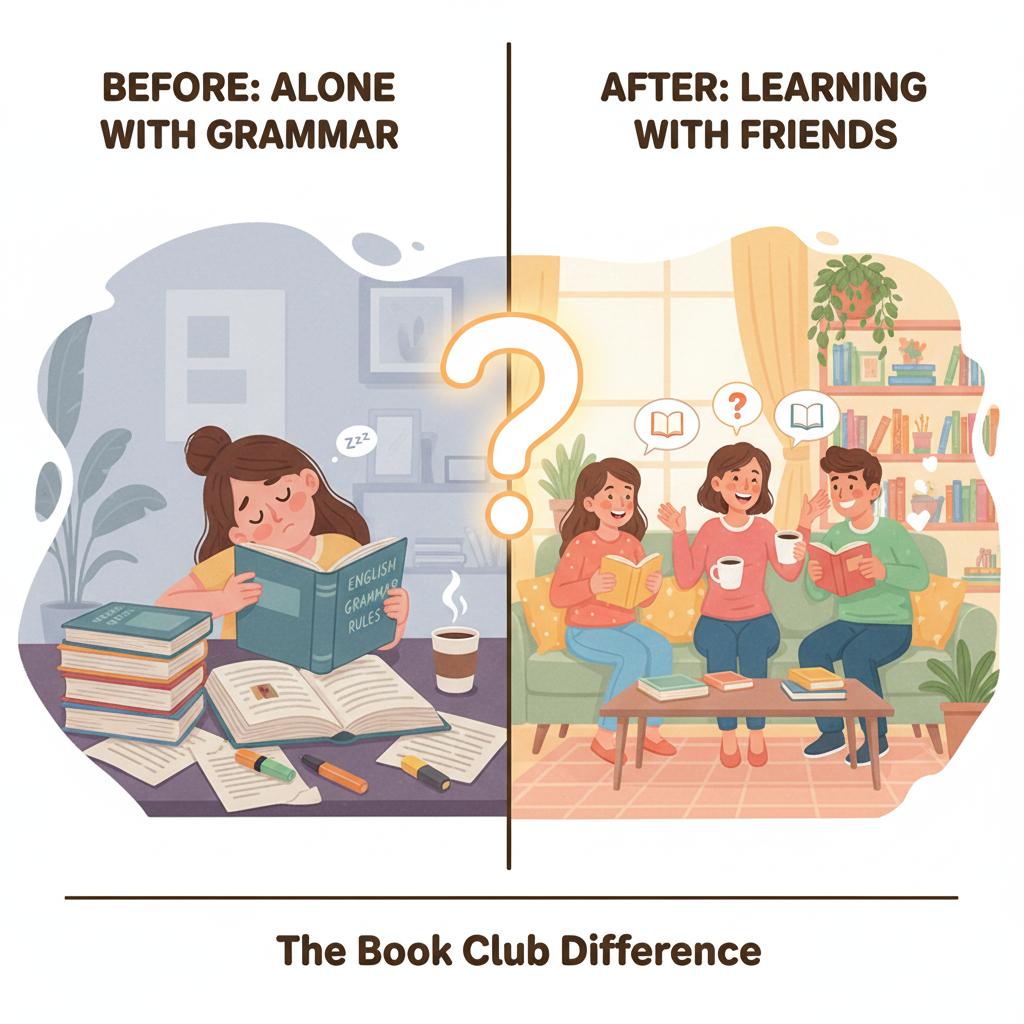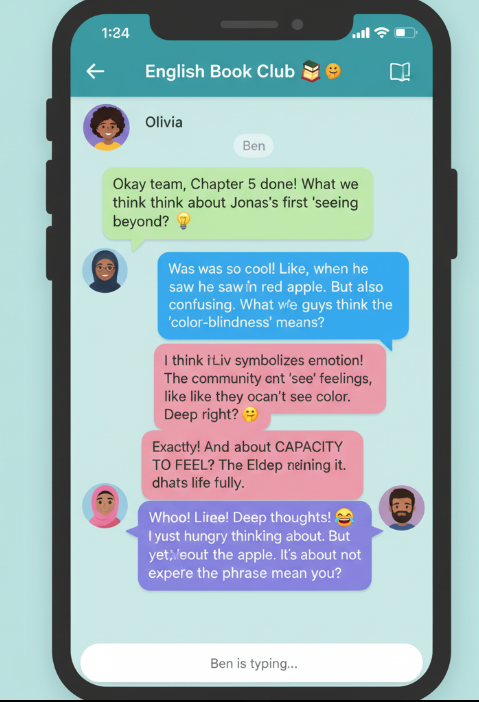Introduction
Let’s be real: staring at a grammar book is the fastest way to fall asleep. If you’re tired of watching your 27th “English tips” video and feeling like you’re getting nowhere, you might be overlooking the most enjoyable secret weapon out there: a book club.

Unlike those lonely nights trying to make sense of grammar rules, a book club turns learning English into a social adventure built on the power of storytelling. You get to laugh, argue about a character’s terrible decisions, and—almost by accident—massively improve your speaking and listening skills.
Reading with other people pushes you to practice, grow your vocabulary, and actually have a good time doing it. Think of it as a Netflix binge for your brain… but with more interesting words and fewer disappointing endings.
So, are you ready to read like a person, not a homework machine?
Why a Book Club Is Your Shortcut to Learning English
Joining a book club isn’t just about pretending you did the reading. It’s about teamwork, staying on track, and letting the language sink in naturally.
Here’s why it actually works:
- You’ll actually remember new words. When you find a word in a story, it has context and emotion attached to it. You start to see natural English collocations, making them way more memorable than a random flashcard.
- You stop just reading and start understanding. Talking about the chapters with others forces you to think deeply about what the text means, instead of just letting your eyes glaze over.
- It’s real speaking and listening practice. Sharing your opinions out loud builds real conversational confidence. You’ll learn how to use discourse markers to connect your ideas and sound more fluent.
- You get the cultural inside jokes. Stories are packed with cultural details you’d never find in a textbook, helping you finally understand the subtleties of humor, sarcasm, and irony in English.
And let’s be honest: knowing your friends are waiting keeps you motivated. It’s a fantastic way to escape the intermediate plateau because you have accountability. If you’re new to structured reading, learning a few skimming and scanning strategies can also help you keep up without feeling overwhelmed.
Beginner-Friendly Books That Won’t Make You Cry
Now for the fun part: the books. 📚 We picked novels that are engaging and simple enough for A1-B1 learners, so you can actually enjoy the story without wanting to throw it across the room. Choosing the right book is just as important as creating a fun English environment at home.

- Charlotte’s Web by E. B. White A beautiful story about a pig named Wilbur and his friendship with a very smart spider. The language is simple and clear, and the themes of friendship and loss are timeless.
- Holes by Louis Sachar A weird, funny, and surprisingly clever story about a boy sent to a bizarre camp where the kids just dig holes all day. The sentences are short, the humor is great, and the dialogue is perfect for discussion.
- The Giver by Lois Lowry A short but powerful dystopian novel about memory, emotion, and society. It uses clean, descriptive language that sparks deep conversations, making it perfect for thoughtful readers.
- The Curious Incident of the Dog in the Night-Time by Mark Haddon Told from the perspective of a 15-year-old boy on the autism spectrum, this story’s direct, simple English is incredibly engaging. It’s also fantastic for discussions about seeing the world differently.
- The House on Mango Street by Sandra Cisneros Written in a series of short, poetic vignettes, this book explores themes of identity and community. Its beautiful, straightforward language makes it a joy for learners to read.
Discussion Questions to Get People Talking
Okay, so everyone has definitely finished the chapter (wink, wink). Now what? The real magic happens when you start talking. If you’re worried about awkward silences, brushing up on the art of small talk can help your conversations flow more naturally.

For Charlotte’s Web
- What do you think friendship really means to Charlotte and Wilbur?
- Which new words in this book did you find interesting?
- How does the story show us that being brave doesn’t always look big and loud?
For The Giver
- If you lived in Jonas’s community, would you want to know about real feelings? Why or why not?
- What was a word or phrase from the book that surprised you?
- What does this story teach us about the price of freedom?
For Holes
- What do you think the “holes” are a symbol for in the story?
- Which character do you think changed the most from beginning to end?
- If you could rewrite one scene, which one would it be and what would you change?
A book club is one of the best kinds of English learning communities you can join, because sometimes you need more than just your cat to talk to.
Conclusion: Make Reading Your English Superpower
Joining a book club is more than just a new hobby—it’s you deciding to finally become the person who enjoys learning English. By reading, talking, and laughing your way through a story, you’re building real-world skills that grammar drills could never teach you.
So go ahead. Pick a book, grab a few friends, or find a club online.
The next time someone asks how your English got so good, you can just lean back, smile, and say,
“Oh, you know. I just read with friends.”
Because that sounds a whole lot cooler than, “I memorized 500 irregular verbs.”
